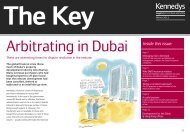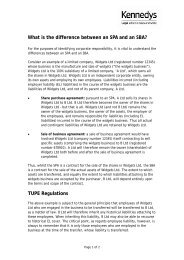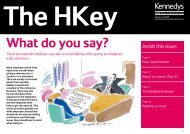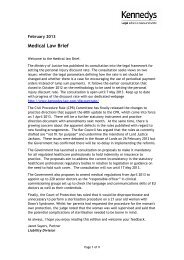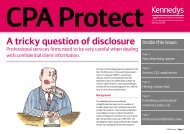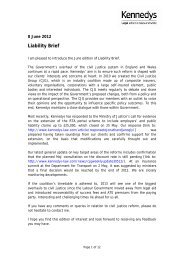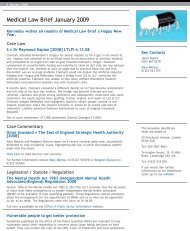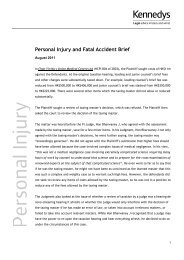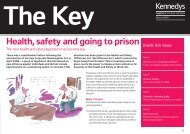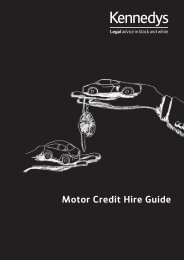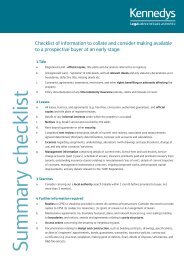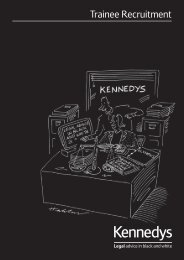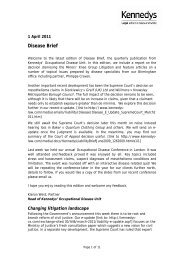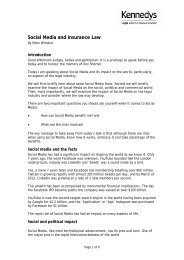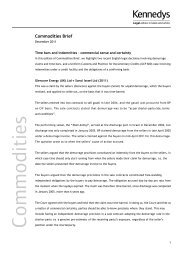Download CPA Protect - Winter 2009 (PDF, 2.6MB). - Kennedys
Download CPA Protect - Winter 2009 (PDF, 2.6MB). - Kennedys
Download CPA Protect - Winter 2009 (PDF, 2.6MB). - Kennedys
You also want an ePaper? Increase the reach of your titles
YUMPU automatically turns print PDFs into web optimized ePapers that Google loves.
<strong>CPA</strong> <strong>Protect</strong> <strong>Winter</strong><br />
<strong>2009</strong><br />
A Victory for Auditors<br />
In the landmark case of Moore Stephens v Stone & Rolls Ltd, the House of Lords in<br />
England has ruled that a company cannot sue its auditors for failing to spot fraudulent<br />
conduct when the company itself has committed the fraud.<br />
In the autumn 2008 issue of <strong>CPA</strong> <strong>Protect</strong>, we<br />
discussed the Court of Appeal decision in Moore<br />
Stephens v Stone & Rolls and its implications for<br />
auditors and their insurers. Thirteen months later,<br />
on 30 July <strong>2009</strong>, the long awaited House of Lords’<br />
decision was delivered. By a majority of three to<br />
two, the company’s appeal was dismissed, thereby<br />
upholding the auditors’ defence of ex turpi causa (ie<br />
the principle that no cause of action may be based on<br />
an immoral or illegal act). The House of Lords agreed<br />
with the Court of Appeal that a one-man company<br />
was debarred from bringing a claim against its auditors<br />
where the company had itself committed the fraud.<br />
Inside this issue:<br />
Page 2<br />
The majority / minority<br />
judgments in a nutshell<br />
Page 2<br />
The judgments in further<br />
detail<br />
- Lord Phillips, page 2<br />
- Lord Walker, page 4<br />
- Lord Brown, page 5<br />
All in all, this is a welcome decision for auditors, who<br />
frequently face claims for negligence and breach of<br />
duty in failing to detect fraud within client companies.<br />
However, on further consideration of the reasons<br />
underlying the judgment, it can be seen that the<br />
decision is very narrow in its scope.<br />
Page 7<br />
Conclusion<br />
<strong>CPA</strong> <strong>Protect</strong> | Page 1
To recap, this case involved an individual fraudster<br />
duty of the auditors. He thought that the answer<br />
in an insolvency scenario, the auditor’s duty extended<br />
be able to bring a claim in respect of the very<br />
who was the controlling mind and will of the company.<br />
to the public policy question raised by the illegality<br />
to protect the interests of creditors.<br />
conduct that the company had induced them to<br />
It was accepted that, in essence, the individual was<br />
the company. The core issue before the House of<br />
Lords was whether the company (which, in effect,<br />
committed the frauds) could later rely on its illegality<br />
and bring a claim against its auditors for failing to<br />
detect its own fraud.<br />
The judgment runs to more than 120 pages, with<br />
Lords Phillips, Walker and Brown delivering the<br />
majority judgments and Lords Mance and Scott<br />
delivering the minority judgments.<br />
The majority judgments in<br />
a nutshell<br />
In analysing the three majority judgments of Lords<br />
Phillips, Walker and Brown, it can be seen that a<br />
central part of the reasoning is that the fraudster –<br />
Mr Stojevic – was the sole directing mind and will<br />
of the company, and its sole beneficial owner. The<br />
company was, in every sense of the expression,<br />
a one-man company.<br />
In their majority judgments, Lords Walker and<br />
Brown both took the view that the dishonesty of the<br />
controller had to be attributed to the company and<br />
that therefore the company had itself committed the<br />
fraud. They held that the rule in the Hampshire Land<br />
(1896) case – namely, that an agent’s fraudulent acts<br />
are not imputed to the principal – does not apply to a<br />
one-man company. Thus, the company’s claim against<br />
the auditors was based upon its own dishonesty. As<br />
such, it failed on public policy grounds.<br />
Coming to the same conclusion, but adopting different<br />
reasoning, Lord Phillips based his judgment on the<br />
defence required the court to examine whether the<br />
auditors’ duty extended to protect those who would<br />
benefit from the claim. Applying established legal<br />
principles, Lord Phillips held that the auditor’s duty<br />
extended only to the exercise of reasonable care in<br />
providing information to the directors and the body<br />
of shareholders. In this instance, this meant providing<br />
relevant information to the fraudster, Mr Stojevic.<br />
Since the auditors owed no duty to anyone who had<br />
acted dishonestly, the illegality defence applied. Lord<br />
Phillips did not consider attribution to be the relevant<br />
issue.<br />
The minority judgments in<br />
a nutshell<br />
Lord Scott and Lord Mance disagreed with the<br />
majority’s conclusion and held that the ex turpi causa<br />
defence did not apply so as to defeat the company’s<br />
claim. They thought that the fraud within the company<br />
could not be attributed to the company so as to deny<br />
the company a claim against the auditors. In coming<br />
to this conclusion, they both relied on the Hampshire<br />
Land principle.<br />
An important distinguishing factor between the<br />
majority and the minority decisions was their<br />
respective views on the question of whether an<br />
auditor’s duty extends to protecting the interests<br />
of creditors. The majority took the view that the<br />
company suffered no loss once it had gone into<br />
liquidation and that any loss was suffered by its<br />
creditors, to whom the auditors owed no duty.<br />
However, Lord Mance disagreed. He believed that<br />
the company did suffer a continuing loss through the<br />
extraction of assets and its increased deficit and that,<br />
The judgments in further detail<br />
Given the significance and implications of this House<br />
of Lords decision, a more detailed analysis of each of<br />
the judgements is set out below.<br />
Lord Phillips<br />
Common sense<br />
Lord Phillips’ initial reaction was that, as a matter<br />
of common sense, the company’s claim could not<br />
succeed. There were three reasons for this:<br />
1. The company was seeking to put itself forward<br />
as the victim of fraud when it was, in fact, the<br />
perpetrator of the fraud. The true victims of the<br />
fraud were the creditor banks. Although the<br />
company had greater liabilities to the banks, this<br />
was not really a loss that it had suffered. It had<br />
started with nothing and its alleged losses were<br />
sums that it acquired by fraud and then paid<br />
away as part of the same fraud. So, Lord Phillips<br />
reasoned, “if a person starts with nothing and<br />
never legitimately acquires anything, he cannot<br />
realistically be said to have suffered any loss”.<br />
2. The auditors were also the victims of the<br />
company’s fraud. They were induced to act as the<br />
company’s auditors by a fictitious and fraudulent<br />
account of the business, given to them on behalf<br />
of the company by the fraudster, Mr Stojevic.<br />
They were deceived in carrying out their audits<br />
by accounts fraudulently prepared on behalf of<br />
the company. Consequently, the auditors should<br />
carry out.<br />
3. In reality, the claim was brought for the benefit<br />
of banks defrauded by the company on the<br />
grounds that the auditors should have prevented<br />
the business from perpetrating the frauds. It<br />
would not be fair, just and reasonable for the<br />
auditor of a company to owe a duty of care to an<br />
indeterminate class of potential victims in respect<br />
of unlimited losses which they might sustain as<br />
a result of the company’s fraud. In Lord Phillips’<br />
words: “If it would not be fair, just and reasonable<br />
for the banks to have a direct claim, then it would<br />
not seem fair, just and reasonable that they should<br />
achieve the same result through a claim brought<br />
by the company’s liquidators for their benefit”.<br />
He accepted that while common sense matters, it<br />
should not be a convenient alternative to the analysis<br />
of relevant legal principles. He then gave his reasoning<br />
and analysis, summarised below.<br />
Attribution and ex turpi causa<br />
The two other judges who delivered the majority<br />
judgments (Lords Walker and Brown) held that the<br />
Hampshire Land principle did not apply to a one-man<br />
company and so Mr Stojevic’s fraudulent conduct<br />
should be treated as the conduct of the company.<br />
Consequently, the ex turpi causa maxim applied<br />
to defeat the claim. Although Lord Phillips did not<br />
disagree on the law of attribution and the Hampshire<br />
Land principle, he did not think it was a relevant<br />
consideration in the light of the present facts.<br />
<strong>CPA</strong> <strong>Protect</strong> | Page 2
On the issue of attribution, Lord Phillips said this:<br />
the company. The company carried on a fraudulent<br />
in the directing mind and will’s misconduct. Lord<br />
negligently failed to carry out the appropriate due<br />
“Where those managing the company are using it<br />
business, the purpose of which was to benefit the<br />
Phillips’ view was that the law, in its current state,<br />
diligence before advancing money to the company.<br />
as a vehicle for fraud, or where there is only one<br />
company. For these reasons, Lord Phillips considered<br />
does not have any mechanism to prevent fraudulent<br />
However, there was no obvious mechanism by which<br />
person who is managing all aspects of the company’s<br />
that the Hampshire Land principle had no application<br />
shareholders from profiting from their dishonesty.<br />
such a lack of care could be relied on by the auditors<br />
activities, there is no difficulty in identifying the fraud<br />
and did not prevent the attribution of the fraudster’s<br />
To do so would require a lifting of the corporate veil<br />
in answer to the claim brought by the company.<br />
as the fraud of the company”. By way of example, he<br />
fraud to the company.<br />
in order to ensure that the fraudulent shareholders<br />
referred to the Royal Brunei Airlines Sdn Bhd v Tan<br />
could not share in the recovery from the directing<br />
Lord Phillips did not think it was right, therefore, to<br />
(1995) case.<br />
The reason why the ex turpi causa principle did not<br />
mind and will.<br />
hold as a matter of general principle that ex turpi<br />
apply in such circumstances was simply because public<br />
causa did not apply to a claim by a company against<br />
Lord Phillips noted that Stone & Rolls was not carrying<br />
policy did not require its application. Where all the<br />
The same problem arose where a company with<br />
its auditors for failing to detect that the company<br />
on any business at all. The fraudster, in the name of<br />
shareholders were innocent, a claim by the company<br />
independent shareholders was considering a claim<br />
had been operating fraudulently, unless it could be<br />
the company, was pretending to carry on a business<br />
against its directing mind and will would not result in<br />
against its auditors. Contributory negligence would<br />
demonstrated how the difficulties to which he had<br />
that was, in fact, a fiction. The fraudster was using the<br />
any individual shareholder recovering compensation<br />
also be an issue. Clearly, it would not seem fair for a<br />
referred could be resolved. So he could not conclude,<br />
company for his own fraudulent purpose in a manner<br />
for their own wrong. But the position became<br />
company to make a full recovery in damages against<br />
as Lords Scott and Mance had done, that ex turpi<br />
that resulted in substantial payments being made to<br />
murkier if some of the shareholders were complicit<br />
auditors for the benefit of banks which had themselves<br />
causa did not apply to the company’s claim. However,<br />
<strong>CPA</strong> <strong>Protect</strong> | Page 3
he added that he was not persuaded that the ex turpi<br />
circumstances where the underlying business which<br />
an individual officer who could not be expected to<br />
victim of the fraud and consequently the Hampshire<br />
causa principle (or the underlying public policy) would<br />
they had been retained to audit was wholly fictitious.<br />
disclose his own fault”.<br />
Land principle had no application.<br />
necessarily defeat the company’s claim if the company<br />
had independent shareholders.<br />
He considered it was “at least arguable that the illegal<br />
purpose of the contract under which Moore Stephens<br />
were retained rendered it unenforceable at the suit<br />
Lord Walker then reviewed the modern authorities<br />
relating to attribution and said that: “In the case of a<br />
A secondary victim?<br />
Duty of auditors<br />
Lord Phillips then reviewed the case law on the duty<br />
of auditors, and whether their obligations extended<br />
to protecting creditors. While it was arguable that the<br />
scope of an auditor’s duty should extend to protecting<br />
the interests that creditors had in the preservation<br />
of assets in the company, he was not prepared to<br />
depart from the reasoning of the House of Lords in<br />
the Caparo Industries plc v Dickman (1990) case<br />
– namely, that such duties were owed only to the<br />
shareholders as a body.<br />
of Moore Stephens by reason of the application of<br />
the principle in Alexander v Rayson [1936] 1 KB<br />
169”. He continued: “More fundamentally, if party A,<br />
by deceit, induces party B to agree to play a part in<br />
a venture that is wholly fictitious, I find it hard to see<br />
how this can give rise to any duty on the part of<br />
party B”.<br />
Lord Phillips therefore concluded that, in the<br />
circumstances of this case, the person to whom the<br />
auditors owed a duty – namely, Mr Stojevic who was<br />
the company’s sole directing mind and will – was<br />
party to the illegal conduct that formed the basis<br />
one-man company… which has deliberately engaged<br />
in serious fraud, I would follow Royal Brunei (and the<br />
strong line of United States and Canadian authority)<br />
in imputing awareness of the fraud to the company,<br />
applying what is referred to in the United States as<br />
the ‘sole actor’ exception to the ‘adverse interest’<br />
principle”.<br />
Accordingly, the Hampshire Land principle had no<br />
application and was irrelevant in the case of one-man<br />
companies. Put more simply, Lord Walker believed<br />
that where the acts of the fraudster were not, in fact,<br />
targeted at the company, the company was not a<br />
In response to the company’s argument that the<br />
company was a secondary victim of the fraud, Lord<br />
Walker disagreed. He concluded that the company<br />
had not been a victim in any ordinary sense and, as<br />
such, the secondary victim test was irrelevant in the<br />
case of a one-man company.<br />
The “very thing” argument<br />
The company put forward what is known as the<br />
“very thing” argument (see further pages 4-5 of the<br />
autumn 2008 issue of <strong>CPA</strong> <strong>Protect</strong>).<br />
Lord Phillips said that “it is difficult to see how the law<br />
can rationally hold an auditor liable when the entire<br />
shareholder body and the entire management is<br />
of the company’s claim. Accordingly, the ex turpi<br />
causa principle provided a complete defence to the<br />
company’s legal action.<br />
embodied in a single individual who knows everything<br />
because he has done everything. If that proposition is<br />
correct, it follows that any breach of duty on the part<br />
of [the auditors] will not sound in damages because it<br />
Lord Walker<br />
Attribution and ex turpi causa<br />
has caused no loss”.<br />
Lord Walker thought that the company was primarily<br />
Accordingly, on the extreme facts of the case, the<br />
intended beneficiaries of the claim fell outside the<br />
scope of any duty owed by the auditors. The sole<br />
person for whose benefit such duty was owed – Mr<br />
Stojevic, who owned and ran the company – was<br />
responsible for the fraud. The scope of the duty<br />
(as opposed to vicariously) liable for the frauds,<br />
because there could be no doubt that Mr Stojevic was<br />
the persona of the company. Lord Walker concluded<br />
that the fraudulent acts of Mr Stojevic were attributed<br />
to the company, as the Hampshire Land case had no<br />
application.<br />
undertaken by the auditors could not extend to those<br />
whom the company might defraud, namely, the<br />
creditors.<br />
After reviewing the cases relating to the Hampshire<br />
Land principle, Lord Walker said: “In all these cases,<br />
there was a company which was the victim of a fraud<br />
Lord Phillips also briefly considered whether the<br />
auditors owed any duty of care to the company in<br />
or serious breach of duty, and the court held that it<br />
was not to be prejudiced by the guilty knowledge of<br />
<strong>CPA</strong> <strong>Protect</strong> | Page 4
The “very thing” that the auditors’ engagement<br />
required them to do was to detect whether the<br />
justice would be the doctrine of contributory<br />
negligence”. He was not convinced that this was<br />
Limitations of ex turpi causa<br />
take the following points into account:<br />
company was engaged in fraudulent action of the<br />
kind that it was, in fact, engaged in. The company<br />
said that “the very thing” argument overrode the ex<br />
turpi causa principle because that principle could not<br />
bar a claim based on the commission of a fraud when<br />
the prevention of the fraud was “the very thing” that<br />
the auditors had been paid to do. To free the auditors<br />
from responsibility from the consequence of their<br />
failure to detect the fraud would be to render their<br />
duty nugatory.<br />
Lord Walker did not share the company’s view on this<br />
point. While checking for fraud was certainly part of<br />
an auditor’s task, Lord Walker said that it was not their<br />
sole or primary task. He held that the essential point<br />
was that a principle of causation could not trump<br />
ex turpi causa where the latter principle applied,<br />
“however short of merits the defendant may be”.<br />
The effect of liquidation<br />
Lord Walker went on to consider the effect of<br />
liquidation on the company’s claim. He noted the<br />
argument that the public policy defence should<br />
not bar claims brought by a company in insolvent<br />
liquidation, where the creditors were innocent parties.<br />
However, he was not prepared to apply a different<br />
a better tool, because “a company’s fraud and its<br />
auditors’ negligence are incommensurable in terms of<br />
blameworthiness and causal potency”.<br />
In summary, Lord Walker was satisfied that the<br />
Hampshire Land principle did not apply, that the<br />
fraudulent acts of Mr Stojevic were attributable to<br />
the company, and that the company was primarily<br />
liable for the frauds. Consequently, the auditors<br />
were entitled to rely on the ex turpi causa rule to<br />
defeat the company’s claim. Lord Walker thought<br />
that a company in liquidation should be treated no<br />
differently to a solvent company and, accordingly, he<br />
was not prepared to expand an auditor’s duty beyond<br />
Caparo. In his view, the legal position was still that<br />
auditors owed no duty to creditors.<br />
Lord Brown<br />
Lord Brown gave short reasons, which “do no more<br />
than echo those of Lord Walker”.<br />
He accepted that the facts of the case were extreme.<br />
Mr Stojevic was the directing mind and will of the<br />
company. The company was, “even on the most<br />
exacting definition of the term”, a one-man company.<br />
Lord Brown went on to stress that he would confine<br />
the ex turpi causa defence to one-man company<br />
frauds. Thus, where innocent shareholders were<br />
involved, there might well be a viable claim (via the<br />
company) against the auditors. But he qualified his<br />
comments as follows:<br />
“This, however, would not be an open-ended<br />
claim, wholly indeterminate as to its potential<br />
scope and extent at the time of the audit, such as<br />
that presently brought. Quite how it would fall to<br />
be confined is no doubt open to argument. But<br />
on one view, it might be limited to the innocent<br />
shareholders’ own loss suffered through the<br />
continuing fraud from the time when, following<br />
a diligent audit, it should have been uncovered<br />
and brought to an end. A claim of that nature<br />
would seem to me to accord altogether more<br />
readily with the policies and principles generally<br />
understood to apply in this context”.<br />
Thus it remains to be seen how courts in future cases<br />
will apply this principle in cases where innocent<br />
shareholders are involved.<br />
The minority judgments: Lord Mance<br />
1. the separate legal identities of a company and its<br />
shareholders;<br />
2. the common law and contractual duties owed by<br />
auditors;<br />
3. the legal and contractual rights that a company<br />
has against those who commit wrongs against it;<br />
4. the distinction between, on the one hand, a<br />
company’s claim for its own net losses (for which<br />
it should be able to sue auditors whose negligence<br />
led to such losses) and, on the other hand, its<br />
creditors’ losses (for which its creditors cannot<br />
sue negligent auditors); and<br />
5. the basic company law principle that the interests<br />
and powers of shareholders yield to those<br />
of creditors in a company that is actually or<br />
potentially insolvent.<br />
After taking these principles into account, Lord Mance<br />
concluded that the auditors could not invoke the ex<br />
turpi causa maxim or deny causation by reference to<br />
the knowledge (and involvement in the fraud) of Mr<br />
Stojevic, if, through the exercise of proper skill and<br />
care, they ought to have detected that the company<br />
was subject to continuing fraud in circumstances<br />
where the company was insolvent and being rendered<br />
increasingly so.<br />
rule to a company in liquidation. Applying the Caparo<br />
decision, that was especially true in the context of an<br />
auditor’s duties that were not owed to a company’s<br />
creditors.<br />
Contributory negligence<br />
In line with Lord Walker, Lord Brown considered that<br />
the Hampshire Land principle did not apply to oneman<br />
companies. In conclusion, he said: “It is on this<br />
basis and this basis alone – the one-man company<br />
or sole actor basis – that I would uphold the Court of<br />
Appeal’s judgment that Stone & Rolls is in no different<br />
or better position than Mr Stojevic himself to resist<br />
Lord Mance delivered a powerful dissenting judgment.<br />
It has been well received by lawyers as well-reasoned<br />
and consistent with established legal principles. It<br />
would not be surprising if some of his comments were<br />
adopted in future decisions on the issues considered<br />
in this case.<br />
Lord Mance did not think it made any difference<br />
whether or not the company was originally<br />
incorporated in order to perpetrate fraud. Whatever<br />
the motives for its incorporation, the company was<br />
not a sham. Once incorporated as a separate legal<br />
entity, it was entitled to be respected as such.<br />
Finally, Lord Walker rejected the company’s<br />
submission that “a more satisfactory tool for doing<br />
the ex turpi causa defence (and the liquidator of<br />
Stone & Rolls is in no better position than either of<br />
them)”.<br />
Essentially, Lord Mance differed from the majority<br />
speeches because, in his opinion, they had failed to<br />
<strong>CPA</strong> <strong>Protect</strong> | Page 5
Insolvency<br />
thing’ that an auditor undertakes is the exercise<br />
of reasonable care in relation to the possibility of<br />
The fact that the company was insolvent at each audit<br />
date was critical, according to Lord Mance. Having<br />
Lord Mance concluded by saying:<br />
A central part of Lord Mance’s reasoning was based<br />
on the insolvency of the company. He did not agree<br />
with the majority that the company could not suffer<br />
any loss simply because it was insolvent. He believed<br />
this would ignore the abstraction of the company’s<br />
assets and wrongly assume that a deficit rendering a<br />
company insolvent was not a loss.<br />
Lord Mance said that, in the case of solvent<br />
companies, it was not disputed that duties were owed<br />
by the directors to the company, as represented<br />
by the body of shareholders. But this duty required<br />
directors of insolvent or borderline insolvent<br />
companies to have regard to the interests of the<br />
company’s creditors as well. This analysis had been<br />
affirmed by the Court of Appeal in West Mercia<br />
Safetywear Ltd v Dodd (1988).<br />
He then looked at the extent of the auditors’ liability<br />
where the company’s directing mind was fraudulent.<br />
He said this:<br />
“Leaving aside situations in which the<br />
directing mind(s) is or are the sole beneficial<br />
shareholder(s), it is obvious – although the Court<br />
of Appeal’s judgment is surprisingly silent on<br />
the point – that an auditor cannot, by reference<br />
to the maxim ex turpi causa, defeat a claim for<br />
breach of duty in failing to detect managerial<br />
fraud at the company’s highest level by attributing<br />
to the company the very fraud which the auditor<br />
should have detected. It would lame the very<br />
concept of an audit – a check on management<br />
for the benefit of shareholders – if the higher<br />
the level of managerial fraud, the lower the<br />
auditor’s responsibility… The fact that a ‘very<br />
financial impropriety at the highest level makes it<br />
impossible for the auditor to treat the company<br />
itself as personally involved in such a fraud, or to<br />
invoke the maxim ex turpi causa in such a case”.<br />
He then went on to reject Lord Phillips’ statement<br />
that “common sense” suggested that the company’s<br />
claim should fail because the auditors were victims<br />
of deceitfully prepared company accounts. To accept<br />
this argument, he believed, would defeat the scope of<br />
auditors’ duties.<br />
Thus, in principle, Lord Mance felt that it was no<br />
answer to an auditor who had failed to discover fraud<br />
to point to the involvement or knowledge on the part<br />
of the company’s directing mind.<br />
He saw no difference where the directing mind also<br />
owned some shares in the company. He believed<br />
this was a matter of basic company law; that the<br />
company’s separate legal personality entitled it to<br />
make a claim.<br />
Where all the shareholders have engaged in fraud<br />
and the company is solvent, the answer is more<br />
straightforward; there is nothing to report (because<br />
the shareholders know the true position), no-one to<br />
complain and therefore no loss.<br />
However, Lord Mance thought the position was very<br />
different where the company was insolvent: “In my<br />
opinion, Moore Stephens’ argument and the majority<br />
conclusion overlook a critical distinction between a<br />
company which is solvent and a company which is<br />
insolvent at the audit date”.<br />
reviewed the relevant authorities, he noted that none<br />
of the cases addressed the present situation of a claim<br />
by the company against its auditors for failure to<br />
pick up a fraudulent scheme rendering it increasingly<br />
insolvent. He also did not think it was inconsistent<br />
with the Caparo or Clarke Pixley (1990) cases to<br />
hold auditors responsible to the company in the<br />
present circumstances. He relied on the following four<br />
reasons:<br />
1. The concern about infinite exposure to third<br />
parties did not exist in the context of a claim by<br />
the company. The company’s claim was to recover<br />
its own loss and not its creditors’ losses, which<br />
were different.<br />
2. The company’s claim for the loss against its<br />
negligent auditors would be the same, irrespective<br />
of whether or not there were shareholders who<br />
were innocent of any involvement in senior<br />
management fraud.<br />
3. It could not be argued that the care to be<br />
expected of the auditors varied according to<br />
whether all of the company’s shares happened to<br />
be owned or controlled by Mr Stojevic.<br />
4. Insolvency introduced new considerations for<br />
the reasons previously explained. The identity of<br />
interest which normally exists between a company<br />
and its shareholders ceased, and the duties of<br />
auditors, like those of directors, must recognise<br />
this. If those in charge of the company acted<br />
contrary to the principles governing insolvency,<br />
then the auditors could no longer treat them as<br />
representing the company and had to take other<br />
action, such as a public report to shareholders or<br />
resignation (which would require the auditors to<br />
give their reasons for resigning).<br />
“It follows that, in my opinion, Moore Stephens<br />
cannot invoke the maxim ex turpi causa or deny<br />
causation by reference to the knowledge of and<br />
involvement in the fraud of Mr Stojevic, if Moore<br />
Stephens ought with proper skill and care to<br />
have detected that Stone & Rolls was subject to<br />
a continuing scheme of fraud in circumstances<br />
in which Stone & Rolls was insolvent and being<br />
rendered increasingly so. Under English law, Stone<br />
& Rolls is thus, in my opinion, entitled to pursue its<br />
present claim against Moore Stephens”.<br />
Contributory fault<br />
While recognising that the House of Lords had not<br />
heard all the arguments on the issue of contributory<br />
fault, Lord Mance made some useful comments<br />
about contributory fault on the part of the company’s<br />
management. He said that the starting point would be<br />
to consider the extent to which contributory fault was<br />
available in respect of non-fraudulent management<br />
failings. This was in regard either to the failings<br />
which the auditors should have detected or different<br />
management failings which nonetheless contributed<br />
to the same loss that the auditors’ negligence allowed<br />
to occur.<br />
However, if the fraud of top management was not<br />
attributed to the company for the purpose of the<br />
ex turpi causa maxim, the obvious conundrum was<br />
why it should be attributed to the company for the<br />
purpose of contributory fault under the Law Reform<br />
(Contributory Negligence) Act 1945.<br />
Despite this problem, in the 2003 case of Barings<br />
plc v Coopers & Lybrand, the contributory fault<br />
<strong>CPA</strong> <strong>Protect</strong> | Page 6
(including the heavily-publicised fraud by the<br />
the company is or may be insolvent. Likewise, the<br />
In Lord Scott’s view, a defence based on ex turpi causa<br />
banks) cannot be taken into account for the purpose<br />
derivatives broker, Mr Nick Leeson) that the judge<br />
auditors owed the same duties to creditors, where the<br />
would not have succeeded if Mr Stojevic (or indeed<br />
of contributory fault?<br />
regarded as attributable to the company was<br />
company is or may be insolvent.<br />
the auditors) had been subjected to a misfeasance<br />
recognised as a ground for a substantial reduction in<br />
recovery against the auditors. Further, in Duke Group<br />
Ltd v Pilmer (1999), the court concluded that, while<br />
The minority judgments: Lord Scott<br />
examination under section 212 of the Insolvency Act<br />
1986. Judgment should accordingly be awarded to<br />
the company.<br />
It will be interesting to see whether, in the future, the<br />
reasoning of Lord Mance is adopted in cases involving<br />
the audit of insolvent companies, thereby allowing<br />
the directors’ knowledge of their own fraud on the<br />
company would not be attributed to the business,<br />
the company would still be regarded as vicariously<br />
liable for the directors’ misconduct – and treated as at<br />
fault on the same basis – for the purposes of enabling<br />
negligent auditors to reduce their liability in tort.<br />
In summary, Lord Mance did not think the auditors<br />
could rely on the maxim of ex turpi causa to deny the<br />
company a claim against the auditors because the<br />
fraud within the company could not be attributed<br />
to the company. The company was a separate legal<br />
entity and suffered a loss through increased liabilities.<br />
A director’s duty to a company requires the director<br />
to have regard to the interests of creditors where<br />
Lord Scott came to the same conclusion as Lord<br />
Mance – namely, that the company’s claim could not<br />
be defeated by attributing the fraudulent conduct of<br />
Mr Stojevic to the company.<br />
Lord Scott thought it would be wrong to attribute<br />
Mr Stojevic’s dishonesty to the company so as to<br />
bar a claim by the company against him. This was<br />
because Mr Stojevic’s fraud constituted a breach of<br />
his duty to the business as an officer of the company.<br />
He thought that the same reasoning should apply to<br />
the claim that was brought against the auditors. They<br />
too owed duties as officers of the company and the<br />
claim brought by the business was for breach of those<br />
duties.<br />
Conclusion<br />
It is clear from the three majority judgments that the<br />
central reason behind the House of Lords’ decision<br />
was the fact that the fraudster was, in effect, the<br />
controller of the company and its sole shareholder. It<br />
seems clear from the decision that the ex turpi causa<br />
maxim will not bar a claim by a company with a large<br />
group of independent shareholders (a public company,<br />
for example) where those shareholders are unaware<br />
that the directing mind and will of the company has<br />
involved the company in fraud. But could this decision<br />
be of any help in cases where there is one fraudulent<br />
director/shareholder and one innocent director/<br />
damages to be recovered from auditors for the<br />
benefit of creditors. At the moment, that is not the<br />
case but this area of the law is still clearly evolving.<br />
shareholder who takes no part in the management<br />
of the company? How would other courts construe<br />
the meaning of a “one-man company”? These are<br />
questions that remain unanswered by this House of<br />
Lords’ decision.<br />
The judgment also contains an interesting discussion<br />
on the duty of auditors in an insolvency context.<br />
Where a company is solvent, how can the court<br />
prevent an award of damages from benefiting<br />
dishonest senior management personnel who are also<br />
Chris Sharrock<br />
c.sharrock@kennedys.com.hk<br />
+852 2848 6349<br />
shareholders in the company? On the other hand, if<br />
the company is insolvent, is it fair for the creditors to<br />
Gigi Shuen<br />
benefit from an award of damages when the auditors<br />
g.shuen@kennedys.com.hk<br />
owed them no duty of care, particularly where the<br />
+852 2848 6305<br />
negligent conduct of the creditors (in most cases, the<br />
<strong>CPA</strong> <strong>Protect</strong> | Page 7
Contacts<br />
Chris Sharrock<br />
Partner<br />
+852 2848 6349<br />
c.sharrock@kennedys.com.hk<br />
Rupert Skrine<br />
Partner<br />
+852 2848 6301<br />
r.skrine@kennedys.com.hk<br />
Toby Brown<br />
Solicitor<br />
+852 2848 6316<br />
t.brown@kennedys.com.hk<br />
Joanie Ko<br />
Solicitor<br />
+852 2848 6318<br />
j.ko@kennedys.com.hk<br />
Gigi Shuen<br />
Solicitor<br />
+852 2848 6305<br />
g.shuen@kennedys.com.hk<br />
For further information about<br />
any of the articles within this<br />
issue please contact the author<br />
concerned or your usual partner.<br />
This newsletter is designed to<br />
provide a summary of recent case<br />
law. It does not purport to be<br />
comprehensive or to offer legal<br />
advice. All rights reserved.<br />
Auckland<br />
Level 6<br />
70 Shortland Street<br />
PO Box 3158<br />
Auckland<br />
New Zealand<br />
Tel: +64 9 379 9011<br />
Fax: +64 9 379 9025<br />
Belfast<br />
5/F Lesley Buildings<br />
61-65 Fountain Street<br />
Belfast BT1 5EX<br />
Northern Ireland<br />
Tel: +44 28 9024 0067<br />
Fax: +44 28 9031 5557<br />
Dubai<br />
PO Box 212620<br />
403 Sheikh Essa Tower<br />
Sheikh Zayed Road<br />
Dubai<br />
United Arab Emirates<br />
Tel: +971 4 321 5685<br />
Fax: +971 4 321 5695<br />
Hong Kong<br />
11th Floor<br />
The Hong Kong Club Building<br />
3A Chater Road<br />
Hong Kong<br />
Tel: +852 2848 6300<br />
Fax: +852 2848 6333<br />
London<br />
25 Fenchurch Avenue<br />
EC3M 5AD<br />
United Kingdom<br />
Tel: +44 20 7667 9667<br />
Fax: +44 20 7667 9777<br />
Madrid<br />
Paseo de la Castellana no 50<br />
3a Planta<br />
28046 - Madrid<br />
Spain<br />
Tel: +34 91 523 7210<br />
Fax: +34 91 523 7212<br />
Singapore<br />
One Phillip Street<br />
#13-00<br />
Singapore 048692<br />
Tel: +65 6891 9390<br />
Fax: +65 6438 7914<br />
Sydney<br />
Level 31, Citigroup Centre<br />
2 Park Street<br />
Sydney NSW 2000<br />
Australia<br />
Tel: +61 2 8215 5999<br />
Fax: +612 8215 5988<br />
Associated offices<br />
Abu Dhabi, Dublin, Karachi,<br />
Lisbon, Mumbai, New Delhi,<br />
Paris, Santiago and Warsaw<br />
www.kennedys.com.hk



